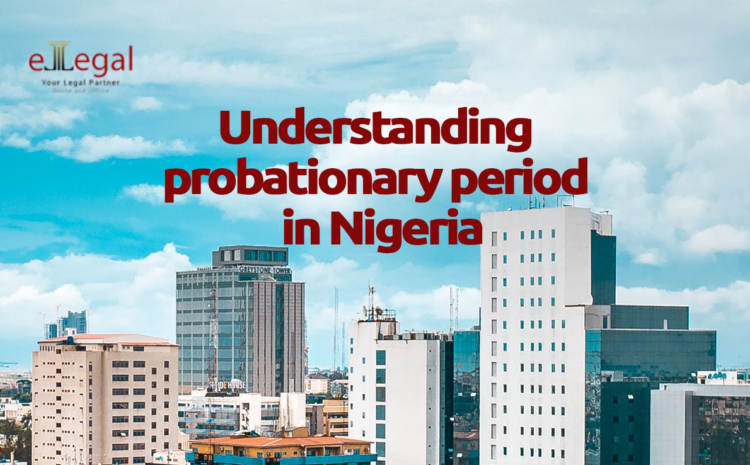
The probationary period is a crucial phase in employment that allows both the employer and the employee to evaluate their working relationship before permanent confirmation. This period serves as a trial phase, where the employee’s performance, skills, and overall suitability for the role are assessed. On the other hand, the employee gets the opportunity to understand job expectations, the work environment, and career growth prospects.
While the Nigerian Labour Act does not explicitly define the probationary period, it is widely practiced across industries and regulated through employment contracts. Failure to comply with fair labor practices regarding probationary employment may result in legal consequences, particularly under the rulings of the National Industrial Court of Nigeria (NICN).
What is Probationary Period?
A probationary period is a temporary phase of employment where an employee works under evaluation before being granted permanent status. The terms of this probationary period—including its duration, expectations, and conditions for confirmation—are typically outlined in the employment contract.
During this period, employees often receive fewer benefits than confirmed staff and may have a shorter notice period for termination.
Employers use this phase to assess whether a new hire meets job expectations, cultural fit, and company policies. Suppose an employer does not confirm or terminate an employee at the end of the probationary period but continues to engage their services. In that case, the NICN may interpret this as an automatic confirmation of employment.
Why Do Employers Implement a Probationary Period?
Employers use probationary periods to:
• Evaluate an employee’s job performance and work ethics.
• Determine whether the employee fits into the company’s culture and values.
• Assess an employee’s ability to meet job expectations before confirming them as permanent staff.
• Minimize the risks of hiring mistakes by providing an exit strategy if the employee is unsuitable.
For employees, probation allows them to:
• Gain firsthand experience of the role and work environment.
• Demonstrate their competence and reliability.
• Assess the company’s culture, expectations, and long-term career prospects.
How Much is Probation Period?
The length of a probationary period varies across industries and employment contracts. In Nigeria, there is no fixed law determining the duration of probation, but it commonly ranges between three to six months. Some employers may extend the probationary period if additional time is needed to evaluate an employee’s performance.
It is important to note that extending a probationary period without the employee’s consent may be considered a breach of contract. Employees should carefully review their employment contracts to ensure that the terms of their probation are clearly defined.
Probation Period in Civil Service
In the Nigerian civil service, the probationary period is typically two years, as prescribed by the Public Service Rules. This extended probation period allows government agencies to assess an officer’s suitability for a permanent role.
During this period, civil servants are required to undergo training, demonstrate competence, and maintain a high standard of work ethics. Performance assessments are conducted periodically, and upon successful completion, employees are confirmed as permanent staff members.
If an officer fails to meet the required standards during probation, the period may be extended, or their employment may be terminated. Civil servants on probation may not have full access to all employment benefits until their confirmation.
The Legal Aspects of Probationary Employment in Nigeria
Although the Nigerian Labour Act does not specify a statutory probationary period, employment contracts and company policies govern its terms. The National Industrial Court of Nigeria (NICN) has played a critical role in clarifying legal issues related to probation, including:
• If an employee continues working after their probation period without official confirmation or termination, they may be deemed a confirmed employee.
• Employers cannot extend a probationary period arbitrarily without the employee’s agreement.
• Employees on probation are still entitled to fair labor practices, including protection from wrongful termination.
To avoid legal complications, both employers and employees should ensure that probationary terms are clearly stated in the employment contract.
What Happens After the Probation Period?
At the end of the probationary period, three possible outcomes may occur:
1. Confirmation – If the employee has met the required performance standards, they receive a confirmation letter and are granted permanent employment.
2. Termination – If the employee fails to meet expectations, the employer may terminate the employment, usually with a shorter notice period.
3. Extension – Some employers may choose to extend the probation period for further evaluation. However, this should be done with the employee’s consent and must comply with contractual terms.
Probation Period Rights and Obligations
Employees on probation have certain rights and obligations, including:
• Right to fair treatment – Employees must not be subjected to discrimination or unfair dismissal during probation.
• Right to wages and benefits – Probationary employees are entitled to the salary specified in their contract. Some benefits may be restricted until confirmation.
• Obligation to perform duties – Employees must fulfill job responsibilities and adhere to company policies during probation.
• Obligation to accept feedback – Constructive feedback and periodic evaluations are part of the probation process. Employees should take this as an opportunity for growth and improvement.
Conclusion
The probationary period is a critical phase in employment that ensures both employers and employees make informed decisions about long-term working relationships. For employers, it serves as a safeguard against poor hiring choices, while for employees, it provides an opportunity to assess their career prospects within the organization.
However, to ensure fairness and legal compliance, probationary terms should be clearly outlined in employment contracts, and both parties should adhere to best labor practices.
At eLegal Consultants, we specialize in employment law and HR consulting, offering expert guidance on employment contracts, probation policies, and workplace compliance. Whether you are an employer seeking to implement a fair and effective probation policy or an employee needing legal advice on your probation rights, our team is here to assist you. Contact us today for professional and reliable legal support!





